Tens of thousands of people in Taipei yesterday took part in the “Autumn Struggle” (秋鬥) — an annual protest march by labor groups — but with this year’s focus on rejecting the government’s plan to allow imports of US pork containing ractopamine residue.
“Against poisonous pork, against double standards, against a party-state,” the protesters, mostly wearing black, chanted in front of the rally’s main stage on Ketagalan Boulevard at about noon, before a parade set off at 2pm.
Autumn Struggle spokesperson Lee Chien-cheng (李建誠) said this year’s march was divided into three teams, with the first team urging food safety and labor rights, the second concentrating on environmental protection and education issues, and the third urging proper land use and freedom of speech.
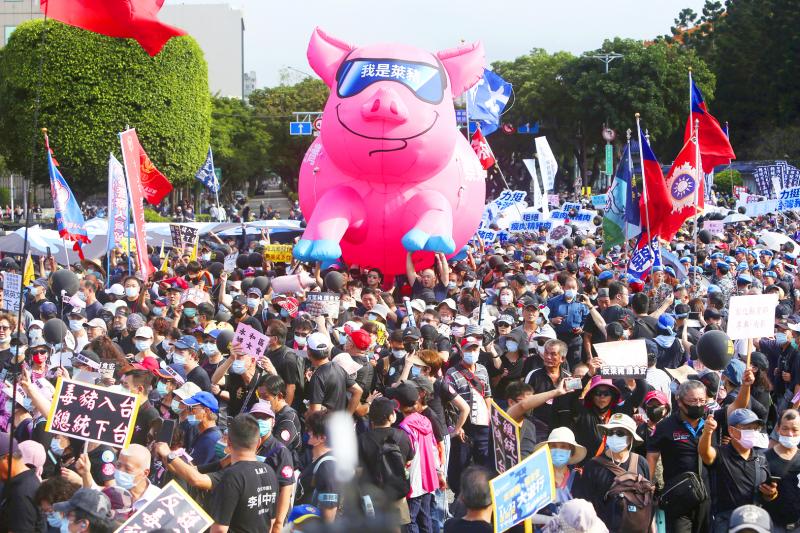
Photo: Chiang Ying-ying, AP
The protesters collectively called on President Tsai Ing-wen (蔡英文) to revoke her executive order to allow imports of US pork containing ractopamine, and for Premier Su Tseng-chang (蘇貞昌) to step down over government policies that caused public complaints, Lee said.
A small, black stage decorated with white flowers was also set up on the back of a truck, mimicking a funeral hall, and black banners hung on the sides read “Ractopamine-containing pork poisoned Taiwan, democracy is dead,” “Say farewell to the health we are about to lose and mourn over Taiwan’s freedom of speech.”
The rally organizers had said political parties were welcome to join the parade, but politicians would not be allowed to speak on the main stage.
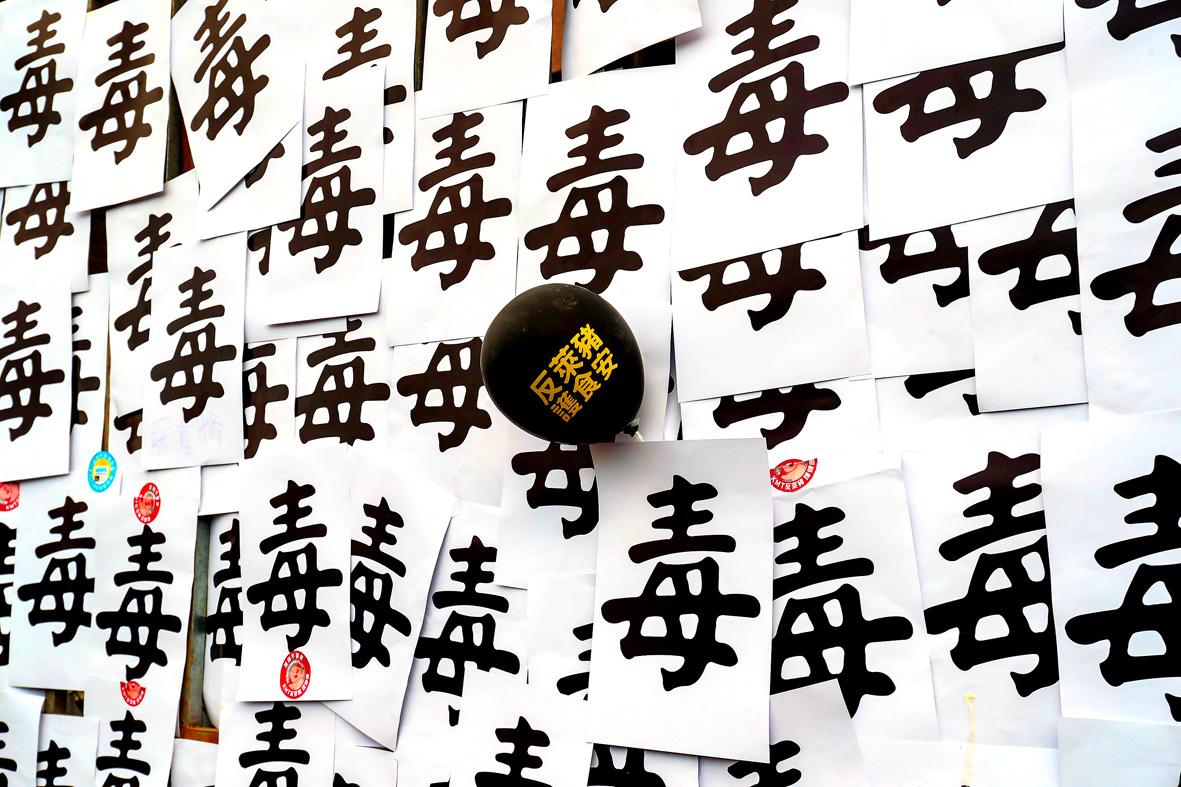
Photo: CNA
The Chinese Nationalist Party (KMT) set up its own stage at Liberty Square, while the Taiwan People’s Party (TPP) called a news conference outside the Chiang Kai-shek Memorial Hall MRT Station.
Two large inflatable pigs flanked the KMT’s stage, while KMT Chairman Johnny Chiang (江啟臣), former president Ma Ying-jeou (馬英九), former vice president Wu Den-yih (吳敦義) and former New Taipei City mayor Eric Chu (朱立倫) addressed the crowd.
“The government does not accept supervision, does not communicate and does not explain, and it is being arrogant and overbearing,” Chiang said.
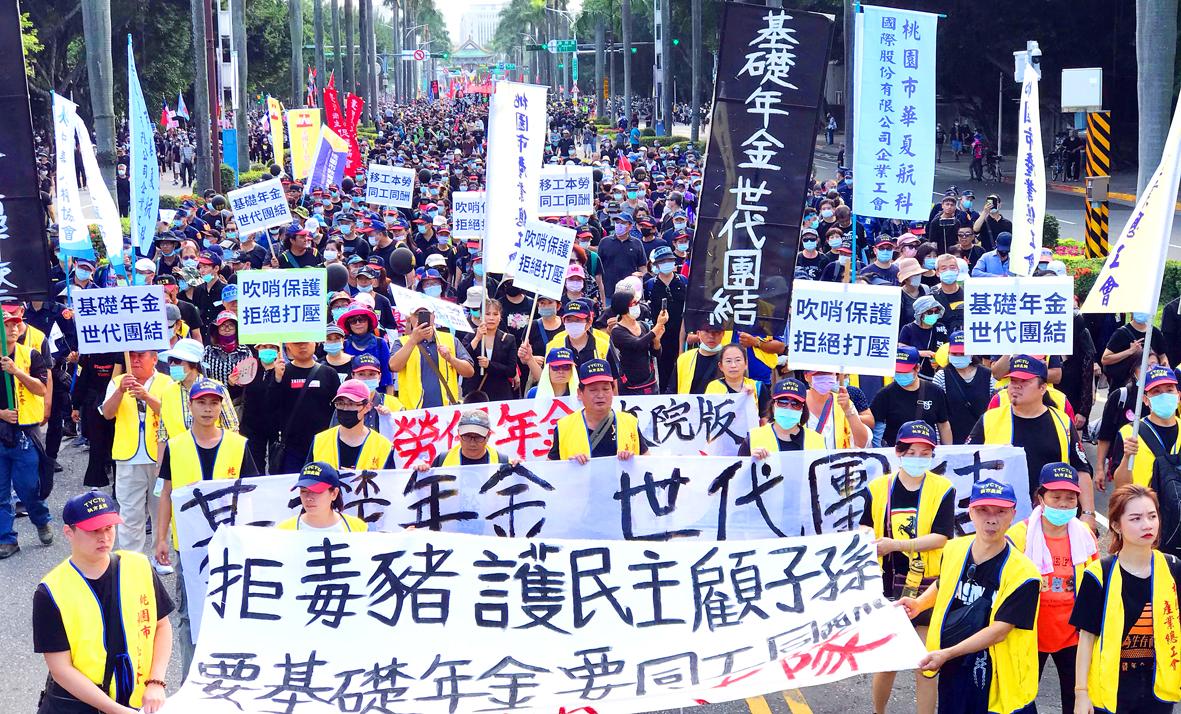
Photo: Liu Hsin-de, Taipei Times
As Tsai had asked then-president Ma to take part in a televised debate over the Economic Cooperation Framework Agreement in 2010, the KMT is now urging Tsai to accept a televised debate on her plan to lift the ban on US pork containing ractopamine.
Ma said more than 160 countries ban the use of ractopamine in animal feed and more people in the US are now against it as well, so Tsai should renegotiate with the US and tell them that Taiwanese welcome US pork, but not pork containing ractopamine.
The KMT said that more than 20,000 supporters joined its protest.
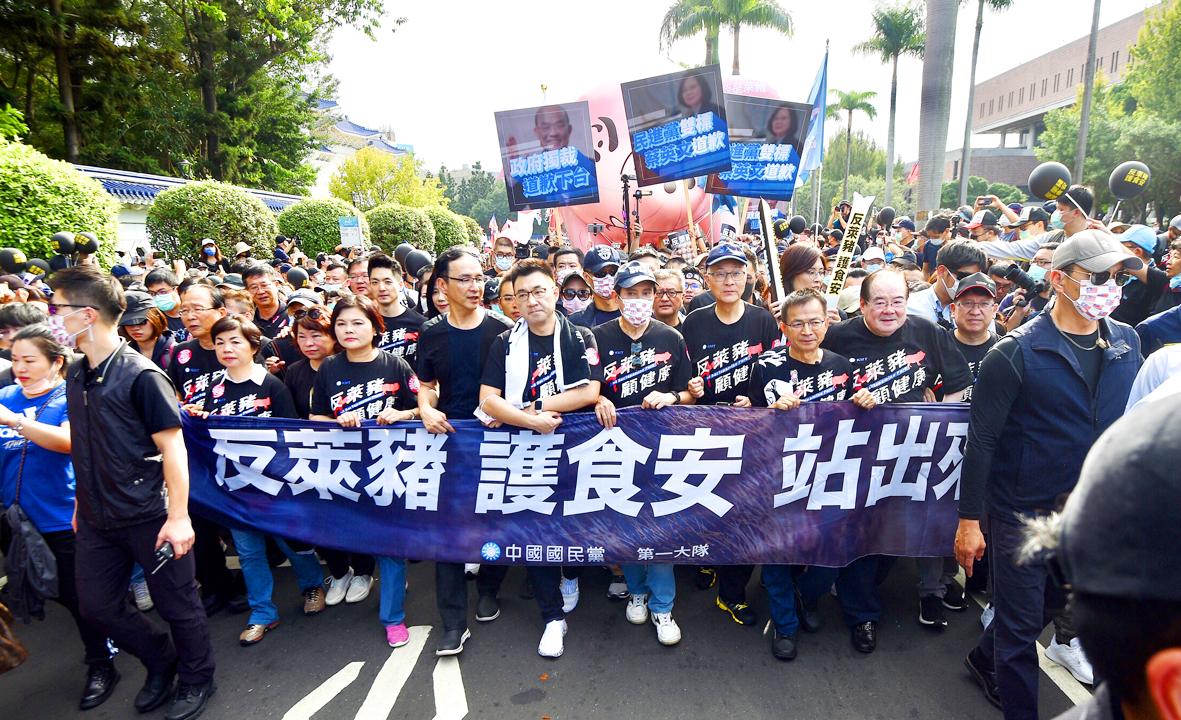
Photo: Peter Lo, Taipei Times
The TPP said that more than 3,000 people joined its rally supporting its two main demands of “source management and clear labeling” on imported US pork containing ractopamine.
TPP Chairman Ko Wen-je (柯文哲), who is also Taipei mayor, was absent on the grounds that he has to uphold administrative neutrality.
TPP Secretary-General Hsieh Li-kung (謝立功) accused the Democratic Progressive Party (DPP) of using double standards, as it was against the importation of pork containing ractopamine when it was in the opposition.
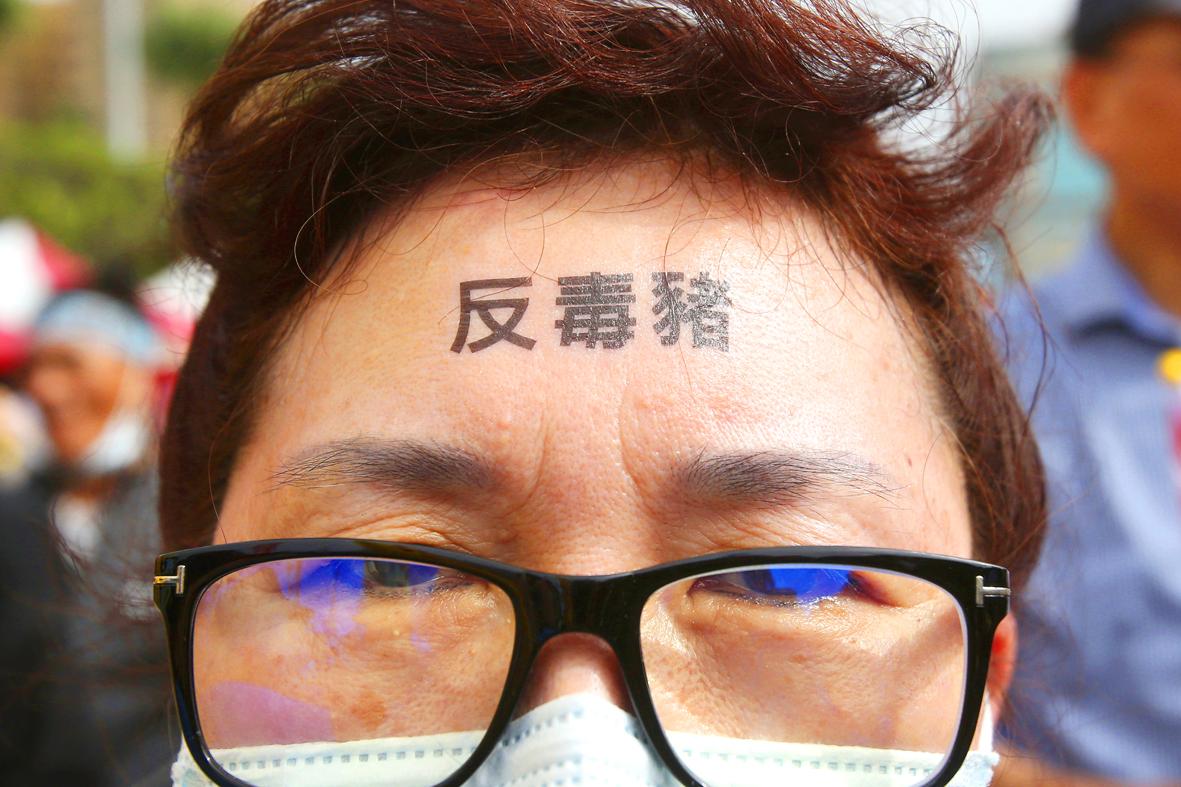
Photo: Chiang Ying-ying, AP
Want Want China Times Media Group (旺旺中時集團) founder and CTi News owner Tsai Eng-meng (蔡衍明) also marched, wearing a black T-shirt that read “I want freedom of speech,” as he accused the DPP government of neglecting public opinion and curtailing freedom of speech.
The National Communications Commission last week refused to renew CTi News’ broadcast license, citing frequent contraventions of media regulations, far exceeding other channels.
The march ended at about 4pm in front of the DPP’s headquarters, where participants pasted paper signs that read “poison” on the fence outside the party’s building.
Organizers said about 50,000 people participated in the rally.
Presidential Office spokesman Xavier Chang (張惇涵) said the government would humbly listen to people’s voices and continue to communicate with the public, but urged the opposition to discuss the issues rationally in the legislature.
Additional reporting by CNA

DAREDEVIL: Honnold said it had always been a dream of his to climb Taipei 101, while a Netflix producer said the skyscraper was ‘a real icon of this country’ US climber Alex Honnold yesterday took on Taiwan’s tallest building, becoming the first person to scale Taipei 101 without a rope, harness or safety net. Hundreds of spectators gathered at the base of the 101-story skyscraper to watch Honnold, 40, embark on his daredevil feat, which was also broadcast live on Netflix. Dressed in a red T-shirt and yellow custom-made climbing shoes, Honnold swiftly moved up the southeast face of the glass and steel building. At one point, he stepped onto a platform midway up to wave down at fans and onlookers who were taking photos. People watching from inside

A Vietnamese migrant worker yesterday won NT$12 million (US$379,627) on a Lunar New Year scratch card in Kaohsiung as part of Taiwan Lottery Co’s (台灣彩券) “NT$12 Million Grand Fortune” (1200萬大吉利) game. The man was the first top-prize winner of the new game launched on Jan. 6 to mark the Lunar New Year. Three Vietnamese migrant workers visited a Taiwan Lottery shop on Xinyue Street in Kaohsiung’s Gangshan District (崗山), a store representative said. The player bought multiple tickets and, after winning nothing, held the final lottery ticket in one hand and rubbed the store’s statue of the Maitreya Buddha’s belly with the other,

‘NATO-PLUS’: ‘Our strategic partners in the Indo-Pacific are facing increasing aggression by the Chinese Communist Party,’ US Representative Rob Wittman said The US House of Representatives on Monday released its version of the Consolidated Appropriations Act, which includes US$1.15 billion to support security cooperation with Taiwan. The omnibus act, covering US$1.2 trillion of spending, allocates US$1 billion for the Taiwan Security Cooperation Initiative, as well as US$150 million for the replacement of defense articles and reimbursement of defense services provided to Taiwan. The fund allocations were based on the US National Defense Authorization Act for fiscal 2026 that was passed by the US Congress last month and authorized up to US$1 billion to the US Defense Security Cooperation Agency in support of the

‘COMMITTED TO DETERRENCE’: Washington would stand by its allies, but it can only help as much as countries help themselves, Raymond Greene said The US is committed to deterrence in the first island chain, but it should not bear the burden alone, as “freedom is not free,” American Institute in Taiwan Director Raymond Greene said in a speech at the Institute for National Defense and Security Research’s “Strengthening Resilience: Defense as the Engine of Development” seminar in Taipei yesterday. In the speech, titled “Investing Together and a Secure and Prosperous Future,” Greene highlighted the contributions of US President Donald Trump’s administration to Taiwan’s defense efforts, including the establishment of supply chains for drones and autonomous systems, offers of security assistance and the expansion of